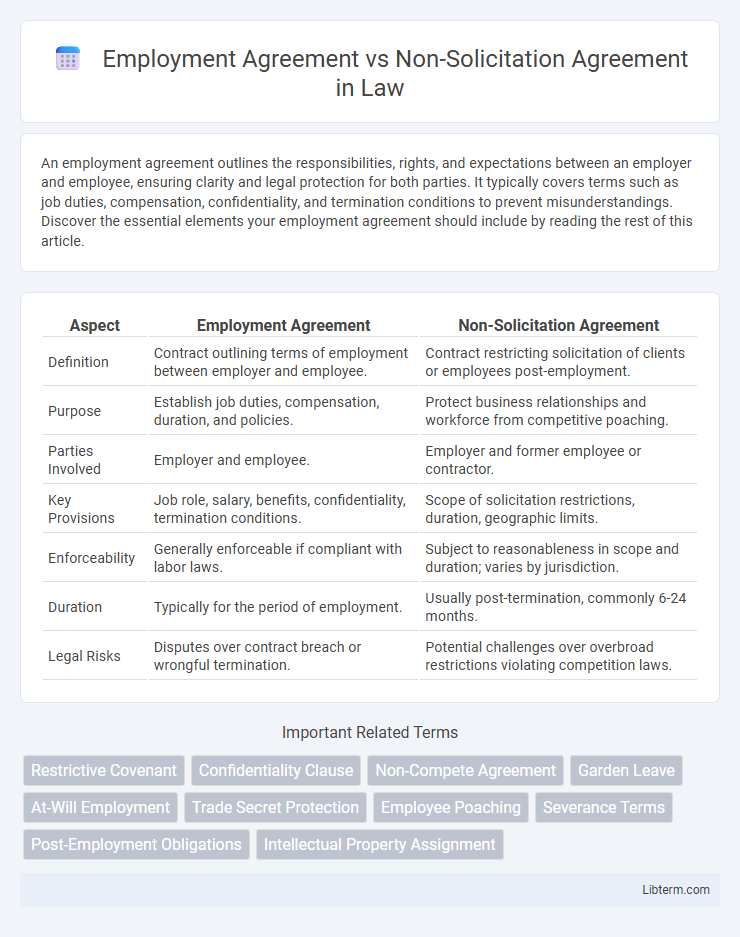An employment agreement outlines the responsibilities, rights, and expectations between an employer and employee, ensuring clarity and legal protection for both parties. It typically covers terms such as job duties, compensation, confidentiality, and termination conditions to prevent misunderstandings. Discover the essential elements your employment agreement should include by reading the rest of this article.
Table of Comparison
| Aspect | Employment Agreement | Non-Solicitation Agreement |
|---|---|---|
| Definition | Contract outlining terms of employment between employer and employee. | Contract restricting solicitation of clients or employees post-employment. |
| Purpose | Establish job duties, compensation, duration, and policies. | Protect business relationships and workforce from competitive poaching. |
| Parties Involved | Employer and employee. | Employer and former employee or contractor. |
| Key Provisions | Job role, salary, benefits, confidentiality, termination conditions. | Scope of solicitation restrictions, duration, geographic limits. |
| Enforceability | Generally enforceable if compliant with labor laws. | Subject to reasonableness in scope and duration; varies by jurisdiction. |
| Duration | Typically for the period of employment. | Usually post-termination, commonly 6-24 months. |
| Legal Risks | Disputes over contract breach or wrongful termination. | Potential challenges over overbroad restrictions violating competition laws. |
Understanding Employment Agreements
Employment agreements define the terms and conditions of the employer-employee relationship, including job responsibilities, compensation, benefits, and termination clauses. These contracts establish legal obligations to protect both parties and ensure clarity regarding expectations and workplace conduct. Understanding employment agreements is essential for maintaining secure job positions and avoiding disputes related to roles, salary, and confidentiality.
What is a Non-Solicitation Agreement?
A Non-Solicitation Agreement is a legal contract designed to prevent employees or former employees from soliciting a company's clients, customers, or other employees after leaving the organization. It protects business interests by restricting competitive poaching and safeguarding confidential relationships. Unlike an Employment Agreement, which outlines job duties and employment terms, a Non-Solicitation Agreement specifically focuses on limiting competitive actions post-employment.
Key Differences Between Employment and Non-Solicitation Agreements
Employment agreements establish the terms of the employer-employee relationship, outlining job duties, compensation, benefits, and termination conditions. Non-solicitation agreements specifically restrict an employee or contractor from soliciting clients, employees, or business partners after leaving the company, aiming to protect business interests and proprietary relationships. Unlike employment contracts, non-solicitation agreements serve as targeted post-employment restrictions rather than comprehensive employment terms.
Core Elements of an Employment Agreement
An Employment Agreement primarily includes core elements such as job responsibilities, compensation details, benefits, employment duration, confidentiality clauses, and termination conditions. It defines the employer-employee relationship, ensuring legal clarity on duties, salary, work hours, and grounds for dismissal. In contrast, a Non-Solicitation Agreement specifically restricts former employees or partners from poaching clients, customers, or staff, serving as a supplementary protection measure rather than a comprehensive employment contract.
Critical Clauses in Non-Solicitation Agreements
Non-solicitation agreements typically include critical clauses such as the scope of restricted activities, duration of the restriction, and the definition of protected parties including employees, clients, or suppliers. These clauses are essential to prevent former employees from poaching clients or colleagues, thereby protecting business relationships and proprietary interests. Precise wording and enforceable terms within these clauses ensure legal compliance and reduce the risk of litigation.
Legal Enforceability: Employment vs Non-Solicitation Agreements
Employment agreements establish contractual obligations between employer and employee, outlining job duties, compensation, and termination conditions, and are generally enforceable under labor laws. Non-solicitation agreements restrict former employees from soliciting clients or staff, with legal enforceability varying significantly by jurisdiction and often requiring reasonable geographic and temporal limits. Courts typically scrutinize non-solicitation agreements for fairness and necessity, whereas employment agreements tend to have broader, more consistent enforceability in maintaining workforce and operational stability.
When Should You Use an Employment Agreement?
Use an Employment Agreement when establishing the fundamental terms of employment, including job responsibilities, compensation, benefits, and duration of employment. It is essential for clearly defining the working relationship and protecting both employer and employee legal rights from the outset. This agreement is crucial for onboarding new hires to ensure mutual understanding and compliance with company policies.
Scenarios Warranting a Non-Solicitation Agreement
Non-solicitation agreements become essential when protecting a company's client relationships and workforce from departing employees who might solicit clients or colleagues to leave. In scenarios such as executive hires, sensitive negotiations, or roles with direct access to key customers or proprietary information, enforcing a non-solicitation clause safeguards business interests. These agreements complement employment contracts by restricting solicitation activities post-termination, thereby preserving competitive advantage and minimizing risks of client or talent poaching.
Potential Risks of Violating Each Agreement
Violating an Employment Agreement can lead to risks such as wrongful termination claims, breach of confidentiality lawsuits, and damage to professional reputation, potentially resulting in financial penalties and loss of career opportunities. Breaching a Non-Solicitation Agreement risks costly legal disputes, including injunctions preventing solicitation of clients or employees, monetary damages for lost business, and strained business relationships. Both agreements carry significant legal and financial consequences that can impact personal and corporate stability.
Choosing the Right Agreement for Your Business Needs
Selecting between an Employment Agreement and a Non-Solicitation Agreement depends on the scope of protection needed for your business assets and relationships. Employment Agreements define the overall terms of employment, including duties, compensation, and confidentiality, while Non-Solicitation Agreements specifically prevent employees from poaching clients or colleagues after leaving the company. Evaluating your business's risk exposure and the importance of client loyalty will guide you in choosing the most effective legal instrument.
Employment Agreement Infographic

 libterm.com
libterm.com